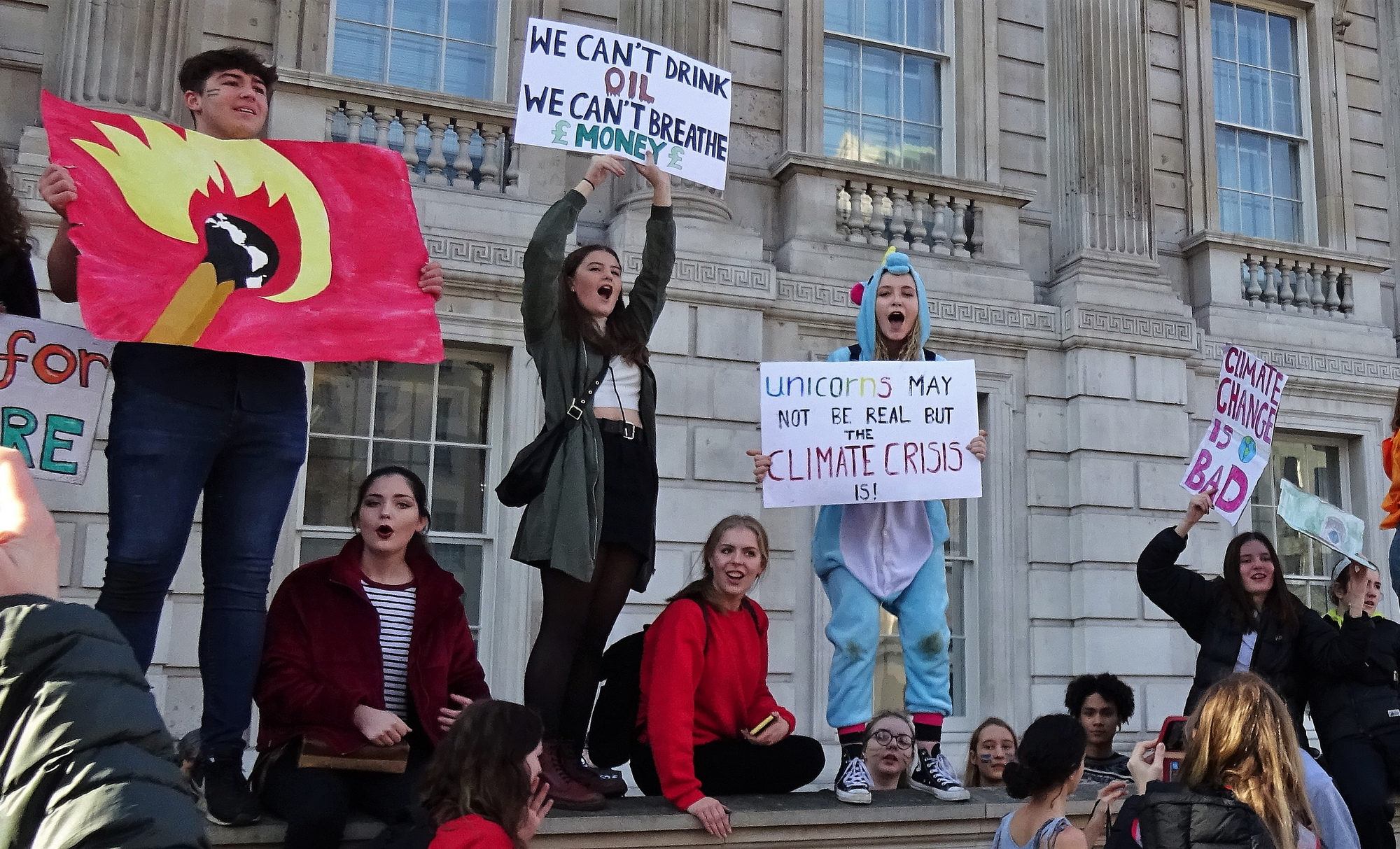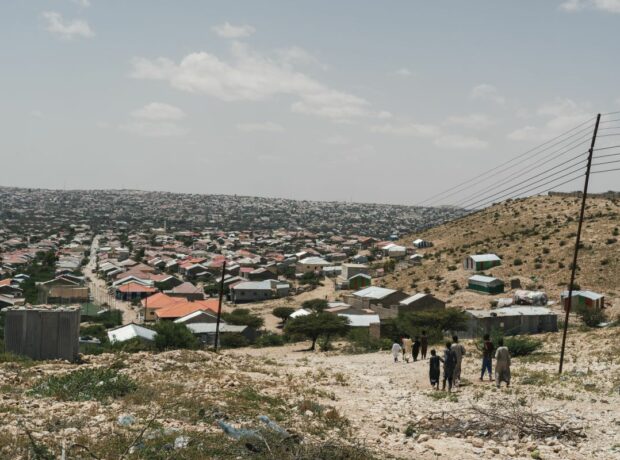As tens of thousands of children around the world join a school climate strike, Warwick University student Alicia Siddons says this new generation of activists has no time for apathy.
Walking towards the University of Warwick bus interchange, I see a world defined by climate change. The bus arrives. Sweaty students disembark dressed for winter in February’s record heat. The trees lining the roundabout are the last ancient remnants of the Forest of Arden that once guarded these grounds. Over by the Humanities block, other trees have been cleared to make space for a new building. Students stop and inspect the mass of twigs and leaves that mourn the site like flowers mark a road-side accident.
Our campus is ever-changing. We take notice of our surroundings. We realise that our natural environment is primary, the built surrounds secondary.
The cities of Bristol, London, Manchester and many others have recognised the urgency of climate change, declaring an official state of “climate emergency”. Hoping to galvanise climate action here in the West Midlands, students at the University of Warwick have mobilised under the banner of Project Climate Emergency; the petition we’re delivering today (March 15) calls on the university to commit to drastically reducing its carbon footprint to net carbon neutrality. We want to eliminate carbon emissions tied to our energy and food consumption, transport to and from campus and all other activities associated with the university – all by 2030.
With the announcement last year that American University in Washington DC has already reached a state of carbon neutrality, students at Warwick believe the target of 2030 is attainable. We want to transform our university into a space that embodies our value of sustainability.
“We also hope to inspire local district and city governance to adopt similar policies,” says Todd Olive, co-leader of the Climate Emergency Coalition running the project.
We are joining tens of thousands of young people who are today demanding an end to climate change apathy, recognising that we could live to see the year 2100 when the world is set to look very different.
*****
Inspired by 16-year-old Greta Thunberg, thousands of school children and students around the world have united under the banner Youth Strike 4 Climate. The movement gained significant traction last November, with some 15,000 young Australians taking to the streets in a country that’s seeing droughts, heatwaves, bushfires and rising temperatures driving ecosystems towards collapse.
In January this year, tens of thousands of children in Belgium, Germany and Switzerland went on strike protesting climate change. In February school children in the UK did the same. With a second global march today (March 15), young climate activists are not backing down.
Nevertheless, youth engagement with climate change has drawn some uneasy responses. US Senator Dianne Feinstein came under fire after she spoke to young activists of the Sunrise Movement, expressing her concern about the Green New Deal being advanced by congresswoman Alexandria Ocasio-Cortez, among other Democratic lawmakers.
“I’ve been doing this for 30 years. I know what I’ve been doing,” Feinstein says during the filmed exchange. “Maybe people should listen a little bit,” she later adds. The video went viral with over 3 million views.
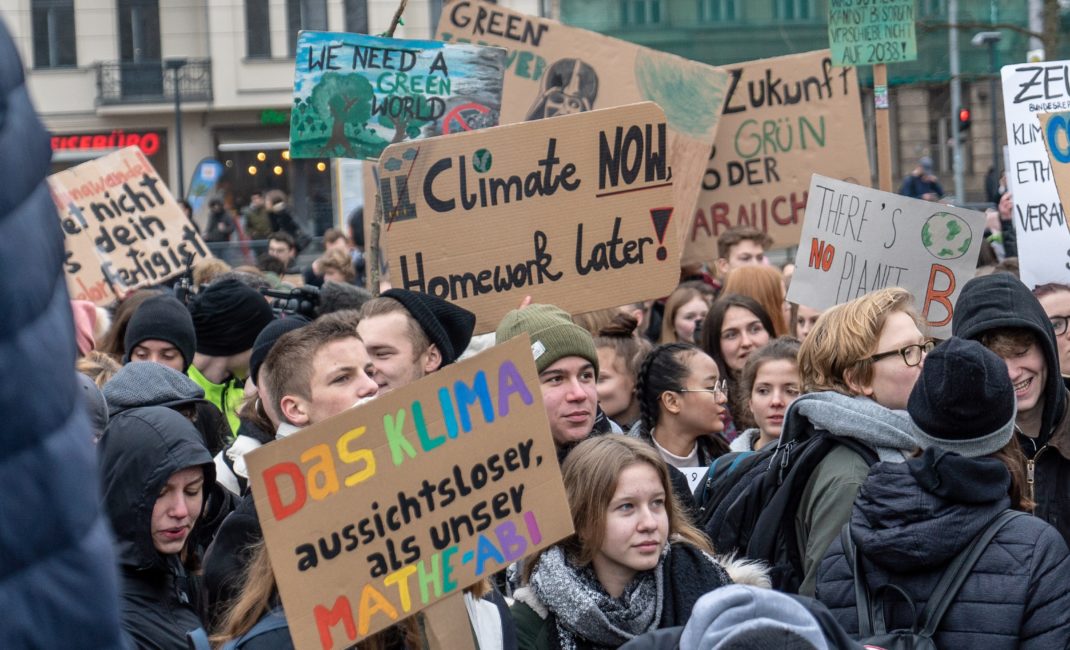
Students take to Invalidenpark, Berlin, for the school strike – by Mika Baumeister
In Germany, Angela Merkel welcomed the “Friday for the Future” student rally in Hamburg as part of a wider global movement. In an interview, the Chancellor shared her support for the initiative but also reminded young people and students of the challenges faced by the government. “I know that a lot of students want a lot of things to happen faster, such as the phasing out of coal-power energy. As the head of government, I need nevertheless to point out that there are other things to consider as well.” Jobs and economic power need to be reconciled with measures to protect the climate, the chancellor suggests.
It is tempting to suggest that politicians around the world have failed to grasp the crux of youth climate activism: the recognition that the climate does not negotiate with our institutions, rising oceans with our coastal cities, air pollution with the health of our lungs, desertification with growing hunger.
Climate change will force governments around the world to change beyond the realm of what Feinstein deems pragmatic. If only politics could transcend bipartisanism, the binaries of capitalism and communism, man against nature.
Students recognise that the Earth is primary, the world of finance secondary.
*****
“It’s up to youth groups to advocate for the environment as a whole,” says Lucy. Lucy has worked with the UK Youth Climate Coalition and was one of many young activists who attended the Conference of Parties in Katowice, Poland, in December.
“You think everyone there is going to be on the same page, but they are not,” she says. “There’s an abhorrent amount of corporate interest.”
This is climate politics as a costume drama – the crowd of suits in enclosed spaces cut off from Earth’s other inhabitants.
“Our principle aim was to advocate for climate justice in that space,” says Lucy.
The first day I wore a pencil skirt, a shirt and high heels. The second day I just wore this,” she points to her plain blue jumper and jeans. “We were just perceived as activists and I thought, ‘I’m not sitting here pretending to be a reporter or a professional. I’m here to learn’.”
I wonder at the disconnect between the conference space and the natural world. Cooped inside buildings armed with the Polish police force, a sea of black and white figures, an aura of self-importance, did one forget to notice the smog of one of Europe’s most polluted cities just beyond the walls and windows?
“I first started campaigning on climate change because I felt powerless and upset,” Lucy says.
Everywhere I looked, I saw nature being destroyed. Once you see climate change, you see it everywhere. A stack of papers, early morning traffic, freakish weather.
“So, I reached out to UKYCC. As it happened, they were recruiting.”
The UK Youth Climate Coalition (UKYCC) is a non-profit organisation of volunteers aged 18 to 29, responsible for, amongst other things, organising the school strikes on February 15. And they are mobilising again today.
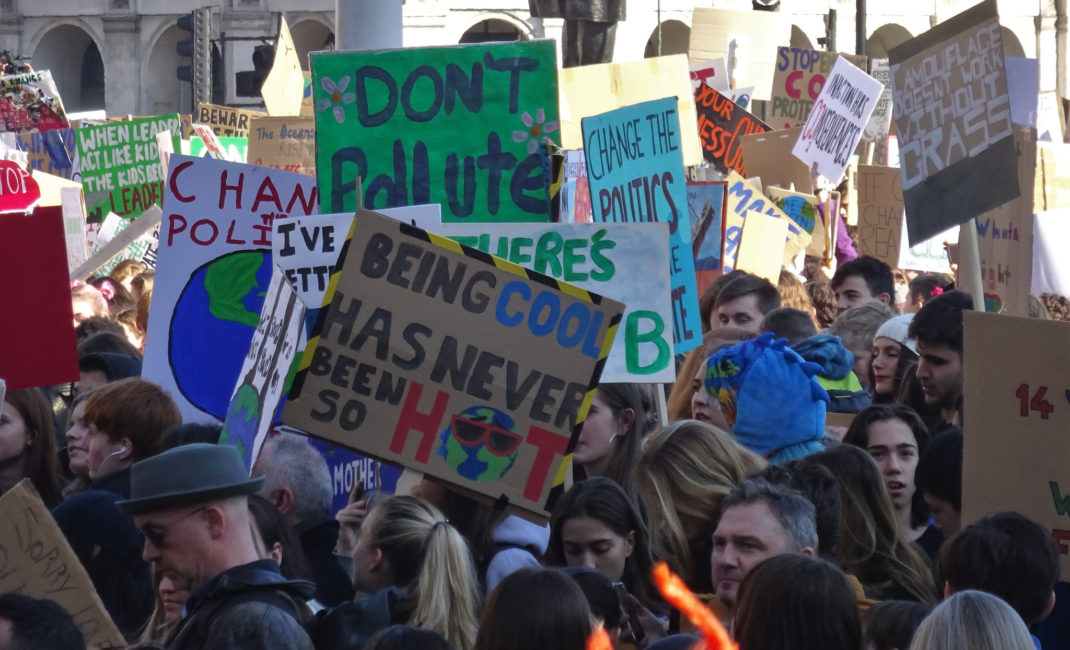
The school climate strikes in London on February 15 by David Holt.
Lucy says: “The idea behind the Youth Strikes, is that, together, a whole generation can send a really powerful message.”
“We’re driven by more than just anger,” she adds. “It’s the fear that the life we are a living now is only temporary.
“Youth campaigning works, because young people have not got jobs or company interests to worry about. We are free.”
This freedom allows young people to see the reality of climate change and the seismic change it demands. It allows us, at the same time, to embrace an opportunity for positive, systemic change. To achieve it, young people champion a different form of politics.
This is exemplified by the leadership model of UKYCC.
“We have a non-hierarchical style of leadership,” says Lucy. “Everything works on consensus. We have a red flag system – whoever raises a red flag explains why they’ve done so and how we can address their concerns. The entire group is centred around wellbeing.”
*****
“Everybody wants young people to be engaged in the issues that affect them most, so that we can build a brighter future for all of us,” according to Theresa May’s spokesperson. “But it is important to emphasise that disruption increases teachers’ workloads and wastes lesson time that teachers have carefully prepared for.”
“That time is crucial for young people, precisely so they can develop into the top scientists, engineers and advocates we need to help tackle this problem.”
Theresa May doesn’t understand that young people are not abandoning the classroom – they are extending it. We have learned that the platform for climate action cannot be contained within conference rooms or classrooms or laboratories. It cannot be contained within parliament.
We invite leaders across the world to learn with us.
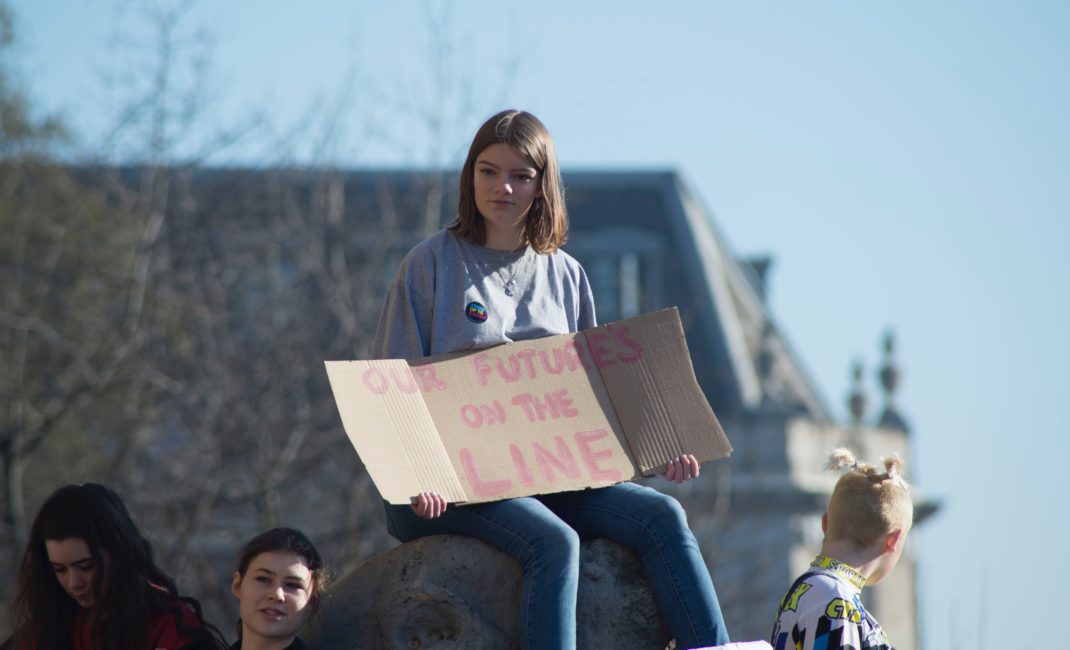
“Our future is on the line” – by Josh Barwick
Main image of the school climate strikes in London on February 15 by David Holt.
